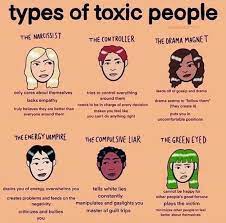02:30:02 pm 10/13/2023
Viewed: 4935
Dealing with Toxic Individuals: Strategies for Self-Improvement and Coping
Identifying Toxic Traits in Others
A toxic personality refers to an individual who consistently exhibits harmful and negative behaviors, attitudes, and traits that can have detrimental effects on themselves and those around them. These traits can manifest in various ways, including:
Manipulative Behavior: Toxic individuals often employ tactics like guilt-tripping, deceit, and emotional blackmail to control others.
Constant Criticism: They frequently criticize and belittle others, eroding self-esteem and confidence.
Narcissism: Some display narcissistic traits, with an exaggerated sense of self-importance and a lack of empathy.
Jealousy and Envy: Toxic individuals may harbor jealousy and envy, leading to resentment.
Dishonesty: They often engage in lying and manipulation, making trust difficult.
Negative Outlook: Toxic personalities focus on problems and may be overly pessimistic, draining positivity from their surroundings.
Lack of Accountability: They avoid taking responsibility for their actions, often shifting blame onto others.
Drama and Conflict: Toxic people thrive on drama and may create tension and disputes.
Boundary Violations: They disregard personal boundaries, invading others' space or sharing private information without consent.
Inability to Apologize or Forgive: They struggle to apologize sincerely or forgive others, hindering reconciliation.
Strategies for Dealing with Toxic Individuals
Dealing with toxic individuals can be challenging but crucial for maintaining well-being. Here are effective strategies:
Recognize and Acknowledge: Acknowledge the toxic behaviors and their impact.
Set Clear Boundaries: Establish and communicate boundaries, and be prepared to enforce consequences.
Limit Contact: Reduce interactions with the toxic person to minimize their negative influence.
Practice Self-Care: Prioritize physical and emotional well-being, seeking support when needed.
Seek Support: Share experiences with trusted friends or support groups for emotional assistance.
Stay Calm and Detached: Maintain emotional control when interacting with toxic individuals.
Avoid Arguments: Refrain from engaging in heated disputes, choosing battles wisely.
Use the Gray Rock Method: Act neutrally to discourage manipulation attempts.
Practice Empathy: Try to understand the underlying causes of their behavior.
Consider Relationship Evaluation: Assess whether limiting or ending the relationship is necessary for your well-being.
Professional Help: Seek therapy or counseling if the situation is severe.
Identifying Toxic Traits in Oneself
Self-awareness is vital for personal growth. Recognizing toxic traits within oneself is the first step toward change:
Self-Reflection: Reflect on past actions, identifying instances of toxic behavior.
Accept Responsibility: Take full responsibility for your actions and their impact.
Seek Feedback: Ask for honest feedback from trusted individuals.
Educate Yourself: Learn about the psychology behind toxic traits.
Set Clear Goals: Define specific toxic traits to change and set achievable goals.
Practice Self-Control: Work on managing emotions and reactions.
Develop Empathy: Try to understand others' feelings.
Apologize and Make Amends: Sincerely apologize and take actions to rectify harm.
Professional Help: Consider therapy or counseling for support.
Practice Patience: Recognize that change takes time and persistence.
Surround Yourself Positively: Spend time with those who model healthy behavior.
Maintain Accountability: Continually assess progress toward self-improvement goals.
The benefits of working towards improvement:
Recognizing and addressing toxic behavior, whether in others or oneself, is a significant step toward fostering healthier connections, promoting personal growth, and improving overall well-being.
1. Improved Relationships:
With Others: By identifying and addressing toxic behaviors in ourselves and others, we can build healthier, more positive relationships. This leads to improved communication, trust, and empathy.
With Ourselves: Recognizing and addressing our own toxic traits can result in improved self-esteem and self-worth, which positively impacts how we relate to others.
2. Enhanced Emotional Well-Being:
Increased Happiness: Healthier relationships and personal growth contribute to a greater sense of happiness and contentment.
3. Personal Growth:
Adaptability: Recognizing toxic behavior in others and learning how to manage or disengage from such situations enhances our adaptability and coping skills.
4. Better Mental Health:
Emotional Resilience: Recognizing and dealing with toxic traits can enhance emotional resilience, helping us navigate life's challenges more effectively.
5. Improved Communication:
Effective Communication: Recognizing toxic communication patterns helps us become better communicators and listeners, which benefits all relationships.
6. Stronger Boundaries:
Healthy Relationships: Clear boundaries lead to healthier, more balanced relationships built on mutual respect and understanding.
7. Increased Empathy:
Understanding Others: Recognizing toxic behavior often involves trying to understand the underlying causes. This practice of empathy can improve our ability to relate to and support others in their struggles.
8. Positive Influence on Others:
Role Modeling: When we address our own toxic traits and cultivate healthier behaviors, we become positive role models for those around us. This can inspire others to work on themselves as well.
In summary, recognizing and addressing toxic behavior is a transformative process that has wide-ranging benefits. It leads to healthier relationships, enhanced emotional well-being, personal growth, improved mental health, better communication, stronger boundaries, increased empathy, and the potential to positively influence others. Ultimately, it paves the way for a more fulfilling and harmonious life.
Identifying Toxic Traits in Others
A toxic personality refers to an individual who consistently exhibits harmful and negative behaviors, attitudes, and traits that can have detrimental effects on themselves and those around them. These traits can manifest in various ways, including:
Manipulative Behavior: Toxic individuals often employ tactics like guilt-tripping, deceit, and emotional blackmail to control others.
Constant Criticism: They frequently criticize and belittle others, eroding self-esteem and confidence.
Narcissism: Some display narcissistic traits, with an exaggerated sense of self-importance and a lack of empathy.
Jealousy and Envy: Toxic individuals may harbor jealousy and envy, leading to resentment.
Dishonesty: They often engage in lying and manipulation, making trust difficult.
Negative Outlook: Toxic personalities focus on problems and may be overly pessimistic, draining positivity from their surroundings.
Lack of Accountability: They avoid taking responsibility for their actions, often shifting blame onto others.
Drama and Conflict: Toxic people thrive on drama and may create tension and disputes.
Boundary Violations: They disregard personal boundaries, invading others' space or sharing private information without consent.
Inability to Apologize or Forgive: They struggle to apologize sincerely or forgive others, hindering reconciliation.
Strategies for Dealing with Toxic Individuals
Dealing with toxic individuals can be challenging but crucial for maintaining well-being. Here are effective strategies:
Recognize and Acknowledge: Acknowledge the toxic behaviors and their impact.
Set Clear Boundaries: Establish and communicate boundaries, and be prepared to enforce consequences.
Limit Contact: Reduce interactions with the toxic person to minimize their negative influence.
Practice Self-Care: Prioritize physical and emotional well-being, seeking support when needed.
Seek Support: Share experiences with trusted friends or support groups for emotional assistance.
Stay Calm and Detached: Maintain emotional control when interacting with toxic individuals.
Avoid Arguments: Refrain from engaging in heated disputes, choosing battles wisely.
Use the Gray Rock Method: Act neutrally to discourage manipulation attempts.
Practice Empathy: Try to understand the underlying causes of their behavior.
Consider Relationship Evaluation: Assess whether limiting or ending the relationship is necessary for your well-being.
Professional Help: Seek therapy or counseling if the situation is severe.
Identifying Toxic Traits in Oneself
Self-awareness is vital for personal growth. Recognizing toxic traits within oneself is the first step toward change:
Self-Reflection: Reflect on past actions, identifying instances of toxic behavior.
Accept Responsibility: Take full responsibility for your actions and their impact.
Seek Feedback: Ask for honest feedback from trusted individuals.
Educate Yourself: Learn about the psychology behind toxic traits.
Set Clear Goals: Define specific toxic traits to change and set achievable goals.
Practice Self-Control: Work on managing emotions and reactions.
Develop Empathy: Try to understand others' feelings.
Apologize and Make Amends: Sincerely apologize and take actions to rectify harm.
Professional Help: Consider therapy or counseling for support.
Practice Patience: Recognize that change takes time and persistence.
Surround Yourself Positively: Spend time with those who model healthy behavior.
Maintain Accountability: Continually assess progress toward self-improvement goals.
The benefits of working towards improvement:
Recognizing and addressing toxic behavior, whether in others or oneself, is a significant step toward fostering healthier connections, promoting personal growth, and improving overall well-being.
1. Improved Relationships:
With Others: By identifying and addressing toxic behaviors in ourselves and others, we can build healthier, more positive relationships. This leads to improved communication, trust, and empathy.
With Ourselves: Recognizing and addressing our own toxic traits can result in improved self-esteem and self-worth, which positively impacts how we relate to others.
2. Enhanced Emotional Well-Being:
Reduced Stress: Addressing toxic behavior helps reduce stress and emotional turmoil caused by toxic interactions or self-criticism.
3. Personal Growth:
Self-Improvement: Identifying and working on toxic traits in oneself leads to personal growth and development. It allows us to become more self-aware and emotionally mature.
4. Better Mental Health:
Reduced Anxiety and Depression: Addressing toxic behavior can alleviate symptoms of anxiety and depression that may be exacerbated by unhealthy relationships or self-criticism.
5. Improved Communication:
Conflict Resolution: Addressing toxic behavior fosters better conflict resolution skills, allowing us to resolve disagreements more constructively.
6. Stronger Boundaries:
Self-Respect: Establishing and maintaining boundaries is a crucial aspect of addressing toxicity. It reinforces self-respect and teaches others to respect our limits.
7. Increased Empathy:
Understanding Others: Recognizing toxic behavior often involves trying to understand the underlying causes. This practice of empathy can improve our ability to relate to and support others in their struggles.
8. Positive Influence on Others:
Role Modeling: When we address our own toxic traits and cultivate healthier behaviors, we become positive role models for those around us. This can inspire others to work on themselves as well.
In summary, recognizing and addressing toxic behavior is a transformative process that has wide-ranging benefits. It leads to healthier relationships, enhanced emotional well-being, personal growth, improved mental health, better communication, stronger boundaries, increased empathy, and the potential to positively influence others. Ultimately, it paves the way for a more fulfilling and harmonious life.
No video exists.





Comments